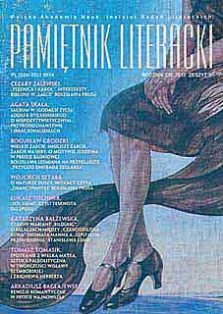„Filutka z filigranu”, czyli o przekładzie językowego naśladownictwa z ekfrastycznych wierszy Wisławy Szymborskiej
“Minx Filigree,” or on the Translation of Linguistic Imitation from Wisława Szymborska’s Ekphrastic Poems
Author(s): Agata Brajerska-MazurSubject(s): Literary Texts
Published by: Instytut Badań Literackich Polskiej Akademii Nauk
Keywords: Wisława Szymborska; Szymborska’s ekphrastic poems; Szymborska’s “Coloratura;” Szymborska’s “Rubens’ Women;” Szymborska’s “A Byzantine Mosaic;” Szymborska’s “Landscape;” Szymborska’s “A Medieval Miniature; Stanisław Barańczak; Clare Cavangh
Summary/Abstract: The article considers the problem of translating linguistic imitation as based on Wisława Szymborska’s ekphrastic poems. Resorting to the notion of katena, it examines the original and the translations of the poem “Coloratura (Koloratura)” as well as offers a detailed discussion on the originals and translations of other poems, i.e. “Rubens’ Women (Kobiety Rubensa),” “A Byzantine Mosaic (Mozaika bizantyjska),” “Landscape (Pejzaż),” and “A Medieval Miniature (Miniatura średniowieczna).” Brajerska-Mazur does not settle the theoretical controversies on arts correspondence, ekphrasis, or the borderline between the literary translation and the intersemiotic one. By contrast, she is interested in a more practical issue, namely to which level of the linguistic imitation the translator is expected to be faithful: to the ekphrastic poem, to the art the poem imitates, or to the reality imitated by the art. The research shows that translating ekphrasis it is best to copy the art imitated by the original. Barańczak and Cavanagh followed the idea and their translations of ekphrastic poems proved perfect, especially those which imitated the style characterized by excess, glamour and comedy (“Coloratura,” “Rubens’ Women,’ “A Byzantine Mosaic”). The translations of poems expressing simplicity in art are slightly worse (“Landscape,” “A Medieval Miniature”), which could be explained by the translators’ tendency to “improve” the poem and “amend” the author by additional play on words and sounds, and by comic effects
Journal: Pamiętnik Literacki. Czasopismo kwartalne poświęcone historii i krytyce literatury polskiej
- Issue Year: 2012
- Issue No: 1
- Page Range: 187-219
- Page Count: 33
- Language: Polish

